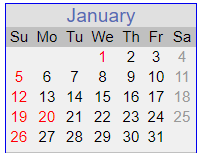Copy the functions from below, then weeknumber(2020, 8, 21, 'Tuesday') will give you the number of the week August 21, 2020 falls into, week count starting on Tuesday, days in 2020 before the first Tuesday will have week number 0.
# necessary imports
from datetime import date, timedelta
import time
You can use this answer (which relies on this answer) to the question How can I select all of the Sundays for a year using Python? to get all Mondays, Tuesdays, Wednesdays, ... Sundays in a given year.
A helper function:
def weeknum(dayname):
if dayname == 'Monday': return 0
if dayname == 'Tuesday': return 1
if dayname == 'Wednesday':return 2
if dayname == 'Thursday': return 3
if dayname == 'Friday': return 4
if dayname == 'Saturday': return 5
if dayname == 'Sunday': return 6
alternatively, (using this):
def weeknum(dayname):
return time.strptime('Sunday', "%A").tm_wday
The main function we are going to use:
def alldays(year, whichDayYouWant):
d = date(year, 1, 1)
d += timedelta(days = (weeknum(whichDayYouWant) - d.weekday()) % 7)
while d.year == year:
yield d
d += timedelta(days = 7)
Now to get the number of week of a given date, do:
def weeknumber(year, month, day, weekstartsonthisday):
specificdays = [d for d in alldays(year, weekstartsonthisday)]
return len([specificday for specificday in specificdays if specificday <= datetime.date(year,month,day)])
specificdays is a list of datetime.date objects in the year being the same weekday as weekstartsonthisday. For example, [d for d in alldays(2020,'Tuesday')] starts like this:
[datetime.date(2020, 1, 7),
datetime.date(2020, 1, 14),
datetime.date(2020, 1, 21),
datetime.date(2020, 1, 28),
datetime.date(2020, 2, 4),
...
As a reminder, 2020 started like this:
![enter image description here]()
The list [specificday for specificday in specificdays if specificday <= datetime.date(year,month,day)] will contain the list of specificdays (ie Mondays, Tuesdays, ..., whichever you specify) which happened in a given year before your date. The len() of this will give us the number of the week. Days in the year before the first specificday will be in the 0 week.
Few examples:
weeknumber(2020,1,1,'Tuesday') returns: 0
weeknumber(2020,1,6,'Tuesday') returns: 0
weeknumber(2020,1,7,'Tuesday') returns: 1
weeknumber(2020,12,31,'Tuesday') returns: 52
weeknumber(2020,1,1,'Wednesday') returns: 1
Seems good.


calendarmodule allows to set thefirstweekdaybut TBH I did not get how to go from adatetimedate to this sort of calendar... – Selfsacrificestrptimeand%jif there is no direct way) and divide by 7? – Selfsacrifice